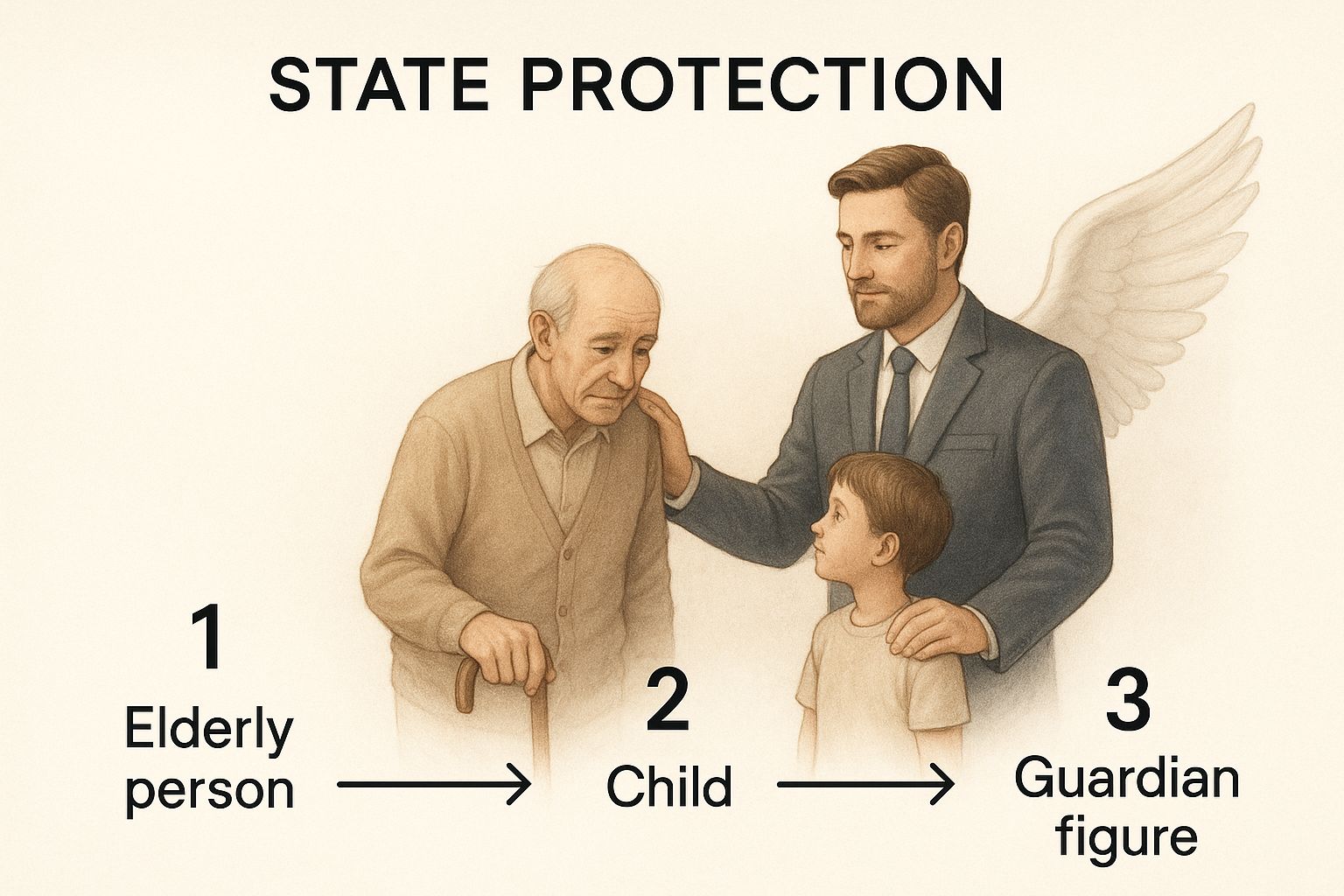When you hear the term “ward of the state,” it can sound cold and impersonal, maybe even a little scary. For families in Texas, understanding this concept is crucial, especially when caring for a vulnerable loved one. In plain English, a ward of the state is a person—either a child or an adult—who a court has determined cannot care for themselves and has no family member or pre-appointed agent available to act as their legal guardian.
The court then places them under the legal protection and care of a government-appointed entity to ensure their safety and well-being. This is always a last resort, taken only when all other support systems have been exhausted.
Understanding the Role of State Protection
Making someone a ward of the state isn't a decision a Texas court takes lightly. It's a profound step meant to create a safety net for our state's most vulnerable residents. This legal status generally applies in two main situations: for children who end up in the foster care system and for incapacitated adults who have no one to look after them.
This infographic gives a clear picture of how the state steps in to protect both children and vulnerable adults.

As you can see, the core idea is to provide a shield of protection when an individual, young or old, is left without a caregiver.
Who Becomes a Ward of the State?
At its heart, a ward of the state is someone who needs a guardian but has no one else to fill that role. This could be a child whose parents can no longer care for them, or an adult who, due to illness or disability, can no longer manage their own affairs. You can find more information about what this means for families and the legal process involved.
The court’s primary goal is always to safeguard the individual from potential harm, neglect, or exploitation. Key scenarios include:
- Minor Children: When a child is abandoned, abused, or their parents have passed away without naming a guardian in a will.
- Incapacitated Adults: When an adult, often due to dementia, a severe illness, or a disability, can no longer make safe decisions about their health or finances and has no family willing or able to help.
To clarify, let's break down the two main categories of individuals who might become a ward of the state in Texas.
Who Can Become a Ward of the State in Texas?
The table below summarizes the two main groups who may be legally designated as a ward of the state and the typical circumstances leading to this outcome.
| Category | Common Reasons for Wardship | Governing Authority |
|---|---|---|
| Minor Children | Abandonment, abuse, neglect, or the death of parents without a designated guardian. | Texas Department of Family and Protective Services (DFPS) |
| Incapacitated Adults | Severe illness, dementia, disability, or other conditions that prevent self-care and decision-making, with no family available to serve as guardian. | Texas Health and Human Services (HHS) or a court-appointed guardian |
Ultimately, both pathways are designed to ensure that someone is looking out for the individual's best interests when they cannot do so themselves.
How Texas Courts Establish a Guardianship

If you're facing the possibility of guardianship for a loved one, understanding the legal journey can make the experience feel far less intimidating. In Texas, the process is a structured, court-supervised path designed to ensure every decision is made with the proposed ward's best interests at the forefront. The entire process is governed by the Texas Estates Code, specifically Title 3.
Here is a step-by-step look at what to expect:
Step 1: Filing the Application
The process begins when a concerned person files an "Application for Appointment of a Guardian" with the appropriate probate court. This document formally asks the court to evaluate whether an individual—known as the proposed ward—is legally “incapacitated.”
Step 2: Proving Incapacity
Under the Texas Estates Code, an "incapacitated person" is an adult who, because of a physical or mental condition, is substantially unable to provide for their own food, clothing, or shelter, or is unable to manage their personal financial affairs. To prove this, the court requires clear and convincing evidence.
A critical piece of that evidence is a physician’s formal evaluation. The court will require a signed and dated letter from a doctor who has examined the proposed ward within the last 120 days. This medical report isn't a suggestion; it's a requirement that details the nature and severity of the person’s condition, providing an objective basis for the court's decision. For families navigating this, getting a sense of how to become a guardian of a minor in Texas can offer extra insight into the state's protective mindset.
Step 3: The Guardianship Hearing
Once the application and medical letter are filed, the court sets a hearing date. The court also appoints an independent attorney, called an attorney ad litem, whose sole job is to represent the proposed ward and protect their interests.
During the hearing, the judge meticulously reviews all the facts. If the judge agrees that the person is incapacitated, they will then appoint a guardian. The court can define this role in two distinct ways:
- Guardian of the Person: Responsible for the ward’s daily life—healthcare choices, living arrangements, and general personal care.
- Guardian of the Estate: Manages the ward’s finances, property, and other assets, all under the strict oversight of the court.
It's important to know that Texas courts always lean toward the least restrictive option. They will only grant the guardian the specific powers necessary to protect the ward, preserving as much of their independence as possible. The system is designed to be protective, not punitive.
A Realistic Scenario: The Garcia Family’s Story
Sometimes, the best way to understand a legal process is to walk through a realistic scenario.
Imagine Mrs. Garcia, an elderly mother living alone in Houston. Her dementia has worsened, and she can no longer safely manage her health or money. She forgets to take critical medications and has been tricked into giving away her savings over the phone.

The situation is complicated because her children live out of state. They love their mother, but they cannot agree on who should move back to Texas to care for her. Their arguments have led to a painful stalemate, leaving Mrs. Garcia in a deeply vulnerable position.
When the State Steps In
A concerned neighbor, noticing Mrs. Garcia's decline, calls Adult Protective Services (APS). An APS investigation confirms the neighbor’s fears: Mrs. Garcia is incapacitated and is not getting the support she needs. Since her children cannot come to a consensus, APS petitions the local probate court to establish a guardianship.
The court reviews the medical reports and listens to testimony from the APS caseworker. Faced with the family’s inability to act and a clear need for someone to step in, the judge declares Mrs. Garcia an incapacitated person. With no suitable family member ready and able to serve, the court appoints a neutral, professional guardian to manage her affairs. In that moment, Mrs. Garcia legally becomes a ward of the state.
This story highlights how state wardship, while a last resort, acts as a critical safety net. The professional guardian is now legally responsible for ensuring Mrs. Garcia gets proper medical care, her bills are paid, and she is safe.
Understanding the Rights of a Ward and Guardian
When a court creates a guardianship, it forges a relationship built on trust and responsibility. The guardian must protect the ward, but this new role doesn't erase the ward's fundamental rights.
The guardian’s entire job is to act in the ward's best interests—a legal mandate under the Texas Estates Code. Every decision must be guided by one question: "What is best for the ward?"
The Guardian’s Court-Ordered Duties
A guardian is an officer of the court with a strict set of rules to follow. These duties are laid out clearly in the Texas Estates Code and are non-negotiable.
- Annual Reporting: Once a year, the guardian must file a detailed report with the court, accounting for the ward’s financial, physical, and emotional well-being.
- Financial Management: Every penny of the ward’s assets must be managed with extreme care. All expenses must be documented and justified.
- Healthcare Advocacy: The guardian is responsible for consenting to medical treatments and coordinating care, aligning with the ward's needs and, whenever possible, their previously expressed wishes.
The Ward’s Protected Rights
Becoming a ward does not mean surrendering all personal freedom. Texas law is built on a core principle known as the "least restrictive alternative." This means a judge will only grant a guardian the specific powers absolutely necessary to keep the ward safe, preserving as much independence as possible.
The appointed guardian operates within the strict limits set by the court. If you feel a guardian is not acting appropriately, or if you disagree with the guardianship itself, it’s critical to know you can learn how to contest a guardianship in Texas probate court. The system has checks and balances designed to provide a safety net while protecting the dignity of your loved one.
Proactive Planning to Avoid State Wardship
The best way to handle a guardianship crisis is to prevent one from ever happening. With proactive planning, you—not a judge—get to decide who manages your affairs if you can no longer do so yourself. This keeps control firmly within your family and avoids the stress of court-imposed guardianship. To avoid state wardship, you need to be proactive, starting with understanding advance care planning. This process lets you put your wishes in writing and legally appoint people you trust to act for you.
Essential Estate Planning Tools
A few key legal documents form the foundation of a solid plan to protect your autonomy.
- Durable Power of Attorney: This is the key for finances. It lets you name a trusted person—your "agent"—to handle your financial life if you become incapacitated. They can pay bills, manage investments, and handle property matters, eliminating the need for a court-appointed guardian of your estate.
- Medical Power of Attorney: This document lets you designate an agent to make healthcare decisions for you when you can't speak for yourself. It is vital for ensuring your medical wishes are followed without causing family arguments at a difficult time.
- Revocable Living Trust: By placing your assets into a trust, you appoint a successor trustee to manage them for your benefit if you become incapacitated. This is another powerful tool to keep the court out of your financial life.
For a deeper dive, you can explore our in-depth explanation of what a power of attorney is and how it works under Texas law. Taking these steps is about protecting your autonomy and giving your family peace of mind.
Key Takeaway for Texas Families
It's natural to feel overwhelmed when facing the possibility of a loved one becoming a ward of the state. Remember that this is, at its heart, a protective measure. The court steps in only when every other option has been exhausted, and its sole purpose is to safeguard Texas's most vulnerable people.
Historically, wardship sometimes had a darker, more exploitative side. Today, however, the laws have changed dramatically. The modern legal view defines wardship as the state’s power to assume control over someone's welfare, but only as a last resort. You can learn more about the evolution of wardship laws and how they shifted toward protection.
The journey through guardianship isn’t one you have to walk alone. By understanding the Texas probate process, knowing the rights that come with a guardianship, and planning ahead with tools like wills and trusts, your family can face these challenges with confidence and clarity.
Your Top Questions About Texas Wardship, Answered
When families face the possibility of guardianship, many questions arise. Here are plain-English answers to the questions we hear most often.
Can a Family Member Become the Guardian Instead of the State?
Absolutely. In fact, the Texas Estates Code strongly prefers it. Courts will always look to a qualified family member first, whether that’s a spouse, an adult child, or a parent. A judge will only turn to a professional or public guardian, making someone a ward of the state, when no suitable family member is willing or able to serve.
How Long Does Someone Remain a Ward of the State?
It depends on the specific situation. For a minor, guardianship usually ends when they turn 18, are legally emancipated, or are adopted. For an incapacitated adult, the guardianship often continues for the rest of their life. However, if the ward's condition improves to the point where they can manage their own affairs again, a court can restore their rights and end the guardianship. The guardian’s required annual reports ensure the ward's circumstances are under regular court review.
What if We Disagree with a Court's Guardianship Decision?
You do not have to accept a decision you believe is wrong. An "interested person"—like a close relative—has the right to challenge the court's appointment of a guardian. This can be complex and may lead to Probate Litigation. Time is critical, and seeking advice from an attorney experienced in this area of law is essential to protect your loved one's interests.
If you’re facing probate in Texas, our team can help guide you through every step — from filing to final distribution. Schedule your free consultation today.







